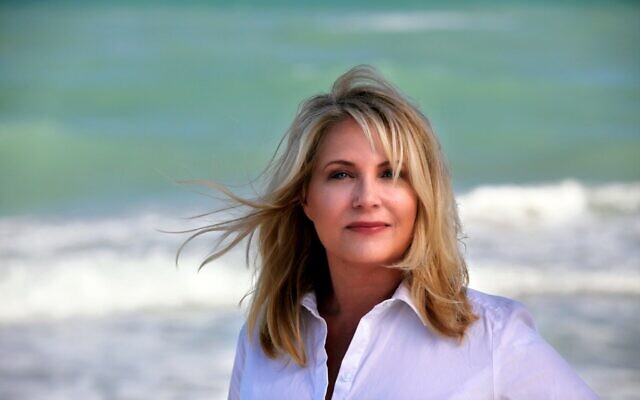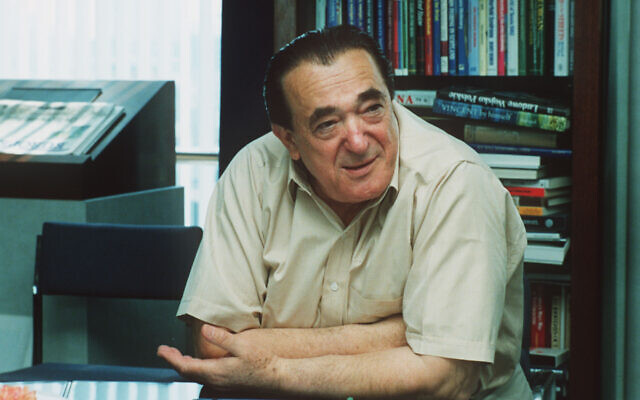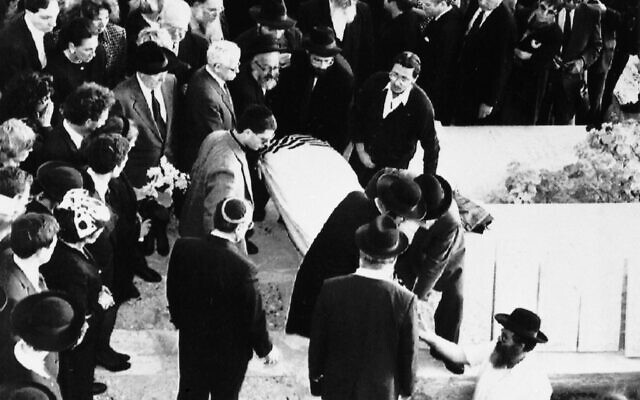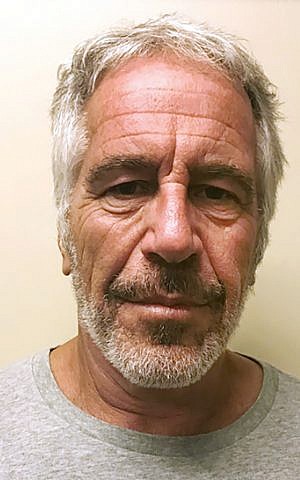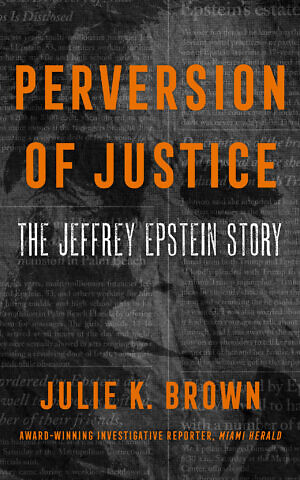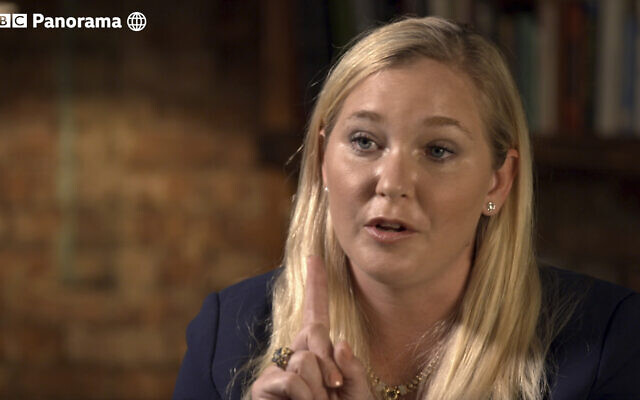timesofisrael.com
For writer who broke Epstein case, a rumored Mossad link is worth digging into
By JP O’ Malley 26 July 2021, 4:23 am Edit
13-17 minutes
Did the now-deceased, disgraced financier and convicted sex offender Jeffrey Epstein have links to the Israeli intelligence community? An investigative reporter for The Miami Herald claims that credible details making the link “are not far-fetched and need to be explored in further detail and examined.”
“It’s not beyond the realm of possibility that Epstein had connections to the [Israeli intelligence community],” says Julie K. Brown, whose book “
Perversion of Justice: The Jeffrey Epstein Story” was released on July 20.
“Robert Maxwell certainly had those kinds of connections, and Epstein had a close relationship with Robert Maxwell,” the 59-year-old American journalist told The Times of Israel via Zoom call from her home in Hollywood, Florida.
Brown keenly stresses the striking similarities between Jeffrey Epstein’s death in August 2019 and Robert Maxwell’s death in November 1991. The 68-year-old British media mogul was said to have drowned after falling from his luxurious yacht, the Lady Ghislaine, near the Canary Islands. Spanish police insisted no foul play was suspected in Maxwell’s death, but rumors about how exactly Maxwell died have never gone away. One theory points to a possible suicide.
Another claims Maxwell was assassinated by the Israeli Mossad intelligence agency, for which he was secretly working.
Maxwell is
buried on Jerusalem’s Mount of Olives. Many members of the Israeli intelligence community attended his funeral. So too did Yitzhak Shamir, Israel’s then-prime minister. Shamir
eulogized the British tyc00n for the political connections he brought to Israel during the 1980s, and for the money he invested in it.
Get The Times of Israel's Daily Edition by email and never miss our top stories
By signing up, you agree to the
terms
Two years ago, while awaiting trial on sex trafficking charges, 66-year-old American financier Epstein was found hanging in his cell in a Metropolitan Correctional Center in Manhattan. Since then, numerous theories have swirled about Epstein’s true cause of death, making the leap from conspiracy fodder
into the cultural mainstream.
Julie K. Brown, author of ‘Perversion of Justice: The Jeffrey Epstein Story.’ (Eileen Soler)
According to Brown, “neither the FBI nor the United States Justice Department have convinced me that Jefferey Epstein committed suicide.”
“Why would Epstein give up before he even got to court?” Brown asks. She also points to a number of other murky details: Epstein breaking three bones in his neck before he died, and the fact that the two prison guards who were supposed to be keeping a watchful eye on Epstein in his Manhattan jail cell mysteriously fell asleep at the same time.
“It just defies common sense,” Brown says. “And why are [US] authorities not making the information they do know about Epstein’s death public?”
The Israel connection
One chapter in Brown’s latest book argues that the complex relationship Jeffery Epstein had with the Maxwell family may provide further answers. That history stretches back to the mid-1980s, when Epstein allegedly began helping
Robert Maxwell hide money in numerous offshore bank accounts.
Maxwell, a self-made billionaire, was born Ján Ludvík Hyman Binyamin Hoch, into a poor, Yiddish-speaking Orthodox Jewish family in Czechoslovakia in 1923. Maxwell lost both his parents in the Holocaust, and later made his fortune in the book publishing and newspaper industries.
He went on to become a parliamentary representative for Britain’s Labour Party, but the final years of Maxwell’s life were plagued by financial trouble and earned him the nickname “the crook of the century.” Maxwell defaulted on $2 billion worth of loans and subsequently raided millions of pounds from his company’s retirement fund, even stealing from his own staff’s pensions and shares in Britain’s Mirror Group as he refused to face his inevitable bankruptcy.
An undated photo of British newspaper magnate Robert Maxwell, who was found dead in the sea off the Canary Islands in November 1991, following a reported fall from his yacht. (AP Photo)
Following Robert Maxwell’s death three decades ago, Epstein became an important figure to certain members of the Maxwell family, who were then left bankrupt and riddled with debt. Brown notes, for instance, that Epstein attended an
event at New York’s Plaza Hotel on November 24, 1991, at which the
YIVO Institute for Jewish Research paid tribute to Robert Maxwell.
The author also speculates that Epstein may have even offered financial assistance to Robert Maxwell’s wife Elizabeth when she became a widow. Epstein then became romantically involved with Elizabeth and Robert Maxwell’s ninth child, Ghislaine.
Known to be her father’s favorite child and his most trusted confidante, Ghislaine Maxwell may have been aware of many secrets her father took to the grave relating to his controversial political, financial, and espionage life, believes Brown.
The body of the late Robert Maxwell is interred at the Jerusalem Jewish Mount of Olives cemetery on November 10, 1991. (AP Photo/Michel Euler)
A budding relationship
After her father’s death, Ghislaine Maxwell moved from London to New York — partially to escape all of the negative publicity surrounding it, but also to reinvent herself in the city’s buzzing celebrity social circle. This was a crucial component of Epstein and Maxwell’s complex relationship: She connected him to powerful figures who were then beyond his reach such as the Clintons, Donald Trump and Prince Andrew. In return, Epstein bankrolled her.
Brown believes Maxwell was in love with Epstein, but Epstein manipulated her to gratify a sexual obsession he had with underage women, which the journalist describes as “a sickness.”
“Epstein was a [sociopath] who felt he had enough power and money to be above the law,” says Brown. “And he believed he was brilliant enough to manipulate anyone to get what he wanted.”
“How much money Ghislaine Maxwell had when her father died has always been a mystery,” says Brown. “But Maxwell enjoyed the high life, and never had any real career or job, so Epstein supported her financially.
In this September 2, 2000, file photo, British socialite Ghislaine Maxwell, driven by Britain’s Prince Andrew leaves the wedding of a former girlfriend of the prince, Aurelia Cecil, at the Parish Church of St Michael in Compton Chamberlayne near Salisbury, England (Chris Ison/PA via AP, File)
Ghislaine Maxwell is currently charged in the United States with lying under oath and recruiting, grooming and trafficking girls to be sexually abused by Epstein from the 1990s through 2004. The 59-year-old outspoken British socialite has pleaded not guilty, and is presently being held in a New York prison awaiting trial, which is set to begin this coming November. If convicted, Maxwell could face up to 80 years in prison.
“So far, Maxwell is playing the same game with her defense [lawyers] as Epstein did: They are throwing every motion they can against these prosecutors to try to wear them down,” says Brown. “But it probably won’t work because the prosecutors that are handling [the case] this time around are much more dedicated and are not going to give up as easily.”
The best of the worst
Brown has a detailed understanding of how prosecutors can be corrupted in a high-profile case relating to sex trafficking accusations: Her newly-released book began as a three-part series of investigative articles she wrote for The Miami Herald in 2018. They exposed a secret plea deal arranged by Epstein’s lawyers, who undermined and manipulated the US criminal justice system so their client, Epstein, could get a softer prison sentence and ultimately escape federal prosecution.
Brown showed how back in 2007 Epstein was accused of assembling a cult-like network of underage girls — with the help of young female recruiters — to coerce into having sex acts behind the walls of his opulent waterfront mansion in Palm Beach, Florida, as often as three times a day.
Brown’s articles also noted how FBI and court records showed Epstein was suspected of trafficking minor girls, often from overseas, for sex parties at his other homes in Manhattan, New Mexico and the Caribbean.
This March 28, 2017 photo provided by the New York State Sex Offender Registry shows Jeffrey Epstein. (New York State Sex Offender Registry via AP, File)
“This dark and deep obsession that Epstein had [with underage women] was an addiction,” says Brown. “And the victims [I interviewed] told me that if they couldn’t bring him [another] girl, he would get angry at them. I imagine Epstein was doing the same thing with Ghislaine Maxwell, saying, ‘You’ve got to bring me more girls.'”
“One of the ironies of this case is that Maxwell seemed to have moved herself away from Epstein just when my series [of articles] came out,” says Brown. “But then the whole [story] resurrected itself in her life again.”
Based on a 53-page federal indictment, Epstein back in 2008 could have potentially ended up in federal prison for the rest of his life. Instead, the non-prosecution agreement Epstein’s lawyers secretly cut with federal prosecutors at the time shut down an ongoing FBI probe into whether there were more victims and other powerful people who took part in Epstein’s sex crimes.
The deal required that Epstein plead guilty to two prostitution charges in a state court and agree to serve just 13 months in a county jail in Palm Beach, Florida. This essentially made the case that Epstein was only paying for sex, when he actually stood accused of sexually abusing minors.
“To see prosecutors, who are supposed to be advocating for victims, work so closely with Epstein’s lawyers to make this case go away was pretty surprising,” says Brown.
The journalist also exposed how Epstein’s enormous wealth and prestige afforded him extra privileges as he served his prison sentence in a Florida county jail. Brown’s book reveals how Epstein was allowed to visit his office in West Palm Beach for several hours every day. Additionally, during the hours he was inside the prison, Epstein was given access to a computer. On at least one occasion, one jail deputy saw Epstein masturbating while he watched one of his female assistants strip naked for him on Skype.
Toppling dominoes
It was not public knowledge that Epstein and four of his accomplices named in the secret plea agreement received immunity from all federal criminal charges until Brown’s explosive expose was published three years ago.
When the story broke, it led federal prosecutors in New York to open a fresh criminal investigation, which resulted in Epstein being subsequently arrested and charged in the summer of 2019. It also led to R. Alexander Acosta resigning as labor secretary in the Trump administration in July 2019. Crucially, Brown’s story explained how Acosta had helped cut the dodgy deal with Epstein’s legal team back in 2008, when he was a federal prosecutor in Miami.





